 There is a Chinese curse that says, “May you live in interesting times.” To be certain, we live in extraordinarily interesting times. And the times we live in affect our lives in various ways, including impacting my reading habits.
There is a Chinese curse that says, “May you live in interesting times.” To be certain, we live in extraordinarily interesting times. And the times we live in affect our lives in various ways, including impacting my reading habits.
Because of what has been going on in politics and world events over the past year, I have been reading much more nonfiction to help me understand these interesting times. I want to better understand the founding of the United States. There are a lot of myths and misunderstandings that tend to find their way into the media and public conversations.
I also want to understand times in our country’s history that are similar to what we are living through right now. How did our ancestors react? What can we do? What should we expect in the future?
I want to better understand the Supreme Court. The current Court is overtly political and dysfunctional. Perhaps more than at any other time in history. I want to understand how we got here and how we can fix it.
Because of my desire to better understand these issues, the list of the ten best books I read in 2023 is heavily skewed toward nonfiction. Of course, that doesn’t mean I didn’t read any fiction this past year. I read some excellent works of fiction that I am excited to include in my list.
Before we begin, let me tell you about the worst book I read all year. The name of the book is Fear the Wolf, and the reason it is noteworthy is because of who wrote it. Fear the Wolf was written by James Patterson and Mike Lupica.
I’m sure you’ve heard of James Patterson. He has sold more books than any other American author. In fact, he probably sold more books in the time it took me to write this sentence than I likely will sell in my entire writing career. His writing often gets criticized as simple and formulaic, but I respect the business he has built around his writing. He found a way to get rich writing books. We should all be so lucky.
Lupica is a well-regarded former sports writer who turned his attention to writing fiction several years ago. I used to read his writing (mostly about baseball) when he was still writing for newspapers, and I thought he was quite good. I also liked watching him on the ESPN show, “The Sportswriters.”
Patterson and Lupica should have produced good, well-written genre fiction. But together, they created a truly horrible book.
Okay, enough complaining. Let’s get to the ten best books I read in 2023.
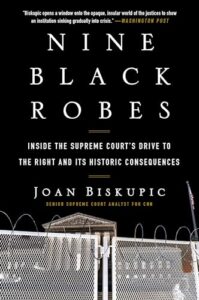
10. Nine Black Robes by Joan Biskupoc and The Supermajority by Michael Waldman – The Supreme Court has been an interest of mine for years. I’ve followed it closely, and I even wrote my master’s thesis on proposed reforms to the Court (and posted a multi-part series about Supreme Court reform proposals last year based on my thesis). Nine Black Robes and The Supermajority both 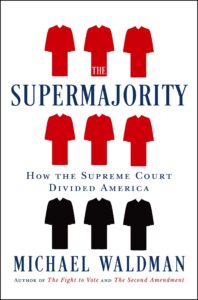 examine the current Court and explore how it came to be so far-right and reactionary. Both books do an excellent job of dissecting the Court; not only how it came to be so ideologically lopsided, but what the results have meant for the country. I understand that most people do not find entertainment in reading about the Supreme Court, but if you do, I recommend both Nine Black Robes and The Supermajority.
examine the current Court and explore how it came to be so far-right and reactionary. Both books do an excellent job of dissecting the Court; not only how it came to be so ideologically lopsided, but what the results have meant for the country. I understand that most people do not find entertainment in reading about the Supreme Court, but if you do, I recommend both Nine Black Robes and The Supermajority.
 9. The Inner Game of Tennis: The Classic Guide to the Mental Side of Peak Performance by W. Timothy Gallwey – Let’s start with this: Timothy Gallwey is a tennis coach. The title of the book is the The Inner Game of Tennis. Even so, this is not a tennis book. It is a book about peak performance and how to achieve it, regardless of whether you are playing tennis, running a business, or teaching a class. I’m a little late to the game, considering that the book was first published in 1997, but the information is still groundbreaking and cutting edge. Gallwey tells stories from his days as a tennis coach, but in many ways, those stories serve as metaphors for the concepts he is teaching. No matter what pursuit you are trying to master, The Inner Game of Tennis can help you strengthen the mental side of your pursuit and perform at your highest level. It’s a relatively short read, but it packs a mighty punch.
9. The Inner Game of Tennis: The Classic Guide to the Mental Side of Peak Performance by W. Timothy Gallwey – Let’s start with this: Timothy Gallwey is a tennis coach. The title of the book is the The Inner Game of Tennis. Even so, this is not a tennis book. It is a book about peak performance and how to achieve it, regardless of whether you are playing tennis, running a business, or teaching a class. I’m a little late to the game, considering that the book was first published in 1997, but the information is still groundbreaking and cutting edge. Gallwey tells stories from his days as a tennis coach, but in many ways, those stories serve as metaphors for the concepts he is teaching. No matter what pursuit you are trying to master, The Inner Game of Tennis can help you strengthen the mental side of your pursuit and perform at your highest level. It’s a relatively short read, but it packs a mighty punch.
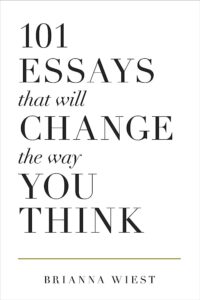 8. 101 Essays That Will Change the Way You Think by Brianna Wiest – I read this book at the end of 2023 and I’m still trying to wrap my head around all of the ideas and concepts Wiest shares. When I say “read,” I should clarify that I listened to the audiobook. I love audiobooks. In fact, audiobooks may be my preferred way to “read.” But I think listening to 101 Essays That Will Change the Way You Think may have been a mistake. I listened straight through, from essay number one to essay number one-hundred-and-one. It was too much, too quickly. I think it would have made sense to read one essay at a time, let it percolate a bit, think about it, and let it settle in my brain or subconscious or wherever great concepts and ideas settle. I think I’m going to read the book again and give that a try. Regardless, I can tell you that if you are searching for a way to think differently about your life, your career, your relationships, and the world around you, this is the book for you. But don’t rush through it. Allow each and every essay to sink in. Consider each essay on its own merits. Unlike most books, this one is like a hundred-and-one separate books, each needing to be consumed individually, like bite-sized Hershey Kisses. And like Hershey Kisses, which are more enjoyable when you eat just one rather than an entire bag all at once, these essays are best consumed one at a time.
8. 101 Essays That Will Change the Way You Think by Brianna Wiest – I read this book at the end of 2023 and I’m still trying to wrap my head around all of the ideas and concepts Wiest shares. When I say “read,” I should clarify that I listened to the audiobook. I love audiobooks. In fact, audiobooks may be my preferred way to “read.” But I think listening to 101 Essays That Will Change the Way You Think may have been a mistake. I listened straight through, from essay number one to essay number one-hundred-and-one. It was too much, too quickly. I think it would have made sense to read one essay at a time, let it percolate a bit, think about it, and let it settle in my brain or subconscious or wherever great concepts and ideas settle. I think I’m going to read the book again and give that a try. Regardless, I can tell you that if you are searching for a way to think differently about your life, your career, your relationships, and the world around you, this is the book for you. But don’t rush through it. Allow each and every essay to sink in. Consider each essay on its own merits. Unlike most books, this one is like a hundred-and-one separate books, each needing to be consumed individually, like bite-sized Hershey Kisses. And like Hershey Kisses, which are more enjoyable when you eat just one rather than an entire bag all at once, these essays are best consumed one at a time.
 7. Drowning by TJ Newman – Finally, a work of fiction. Drowning is the second book in two years by TJ Newman to make my top ten list. Admittedly, Newman’s books are not my usual read. For whatever reason, I usually enjoy quieter reads that are more character-centered. That doesn’t mean I don’t love a good plot. I absolutely do. But I prefer my plots to occur in the real world (usually) involving situations we can all relate to. Newman’s books are not that. For instance, in Drowning, a plane crashes shortly after takeoff and plunges into the Pacific Ocean. The Navy is dispatched to rescue (or, more likely, recover) the passengers, but then a government contractor–an engineer working nearby for the Navy–gets involved, and it becomes clear that she and her crew are key to saving the doomed souls onboard the plane. Oh, and it just happens that her husband and daughter are among the passengers. Granted, this isn’t a plot most of us can relate to. But what we can relate to is the love a mother and wife have for their daughter and husband. We can relate to the desperation such a woman would feel. And we can understand and relate to the subtle (and not so subtle) misogyny involved when a woman challenges the Navy and questions their methods and resolve. Drowning is an exciting thriller, and Newman is relentless in the way she moves the story forward, with one cliff-hanger after another. If you want to get the book, see the link above. If you want to learn more about the author, TJ Newman, and her journey to bestsellerdom, I wrote a bit about it here.
7. Drowning by TJ Newman – Finally, a work of fiction. Drowning is the second book in two years by TJ Newman to make my top ten list. Admittedly, Newman’s books are not my usual read. For whatever reason, I usually enjoy quieter reads that are more character-centered. That doesn’t mean I don’t love a good plot. I absolutely do. But I prefer my plots to occur in the real world (usually) involving situations we can all relate to. Newman’s books are not that. For instance, in Drowning, a plane crashes shortly after takeoff and plunges into the Pacific Ocean. The Navy is dispatched to rescue (or, more likely, recover) the passengers, but then a government contractor–an engineer working nearby for the Navy–gets involved, and it becomes clear that she and her crew are key to saving the doomed souls onboard the plane. Oh, and it just happens that her husband and daughter are among the passengers. Granted, this isn’t a plot most of us can relate to. But what we can relate to is the love a mother and wife have for their daughter and husband. We can relate to the desperation such a woman would feel. And we can understand and relate to the subtle (and not so subtle) misogyny involved when a woman challenges the Navy and questions their methods and resolve. Drowning is an exciting thriller, and Newman is relentless in the way she moves the story forward, with one cliff-hanger after another. If you want to get the book, see the link above. If you want to learn more about the author, TJ Newman, and her journey to bestsellerdom, I wrote a bit about it here.
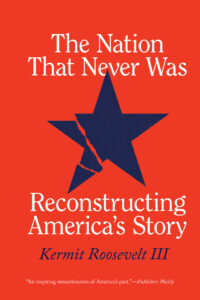 6. The Nation That Never Was by Kermit Roosevelt III and The Second Founding by Eric Foner – Academically, these were the two best book I read in 2023. I say they were the best, not because of the quality of the writing (I’ll get to that in a minute), but because of the eye-opening way they both view the original founding of the United States and the way the Civil War and the post-Civil War
6. The Nation That Never Was by Kermit Roosevelt III and The Second Founding by Eric Foner – Academically, these were the two best book I read in 2023. I say they were the best, not because of the quality of the writing (I’ll get to that in a minute), but because of the eye-opening way they both view the original founding of the United States and the way the Civil War and the post-Civil War 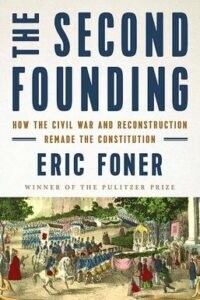 amendments to the Constitution so profoundly changed our country. In fact, I would argue, we are still discovering just how profound those changes were. The story we tell ourselves as Americans—that our core values as a nation were stated in the Declaration of Independence, fought for in the Revolutionary War, and made law in the Constitution—not only no longer serve us, but the story isn’t even true. The values we hold dear—particularly personal liberty and equality before the law—were not part of our Founding Fathers’ vision. Instead, those values were stated in Lincoln’s Gettysburg Address, fought for in the Civil War, and made law through the Reconstruction Amendments. Roosevelt (the great-grandson of Theodore Roosevelt) and Foner both mine this idea in different ways and from slightly different perspectives. The one criticism I have of both books (Honestly, who am I to criticize) is that the books, which are written by academics for a lay audience, fall somewhere in between academic and popular nonfiction. They’re not quite dense and detailed enough to be considered academic tomes, yet they aren’t entertaining enough for the average layman. After all, they are telling an exciting story that most of us are at least a little familiar with. Both books would have benefited from more storytelling and less step-by-step progression. But to be clear, I still enjoyed reading both books and would highly recommend them both to anyone that wants to better understand the history of our country and our constitution.
amendments to the Constitution so profoundly changed our country. In fact, I would argue, we are still discovering just how profound those changes were. The story we tell ourselves as Americans—that our core values as a nation were stated in the Declaration of Independence, fought for in the Revolutionary War, and made law in the Constitution—not only no longer serve us, but the story isn’t even true. The values we hold dear—particularly personal liberty and equality before the law—were not part of our Founding Fathers’ vision. Instead, those values were stated in Lincoln’s Gettysburg Address, fought for in the Civil War, and made law through the Reconstruction Amendments. Roosevelt (the great-grandson of Theodore Roosevelt) and Foner both mine this idea in different ways and from slightly different perspectives. The one criticism I have of both books (Honestly, who am I to criticize) is that the books, which are written by academics for a lay audience, fall somewhere in between academic and popular nonfiction. They’re not quite dense and detailed enough to be considered academic tomes, yet they aren’t entertaining enough for the average layman. After all, they are telling an exciting story that most of us are at least a little familiar with. Both books would have benefited from more storytelling and less step-by-step progression. But to be clear, I still enjoyed reading both books and would highly recommend them both to anyone that wants to better understand the history of our country and our constitution.
 5. The Time Traveler’s Wife by Audrey Niffenegger – This is the book that launched the popular HBO series (which I have never seen). I said in an earlier review that I prefer realistic fiction, but there’s something about time travel that I just love. I’m not big on other science fiction, but I really do enjoy most time travel novels. The Time Traveler’s Wife is no exception. The book tells the story of Henry and Claire, a couple that is living two very different lives. Claire is living a normal, sequential life where one minute comes at a time and each day follows the one before it. Henry is a time traveler, jumping around in time from the past to the future, and he can’t seem to control when or where he goes. The book has rich and interesting characters, and a plot that is intricate, and at times, heartbreaking. But it can be hopeful too. I mean, think about the endless complications uncontrolled time travel can wreak on a relationship, yet Henry and Claire remain fully committed to one another no matter what situations arise or tragedy befalls them. Which is kind of the secret of this book. It involves time travel, but it’s really a love story.
5. The Time Traveler’s Wife by Audrey Niffenegger – This is the book that launched the popular HBO series (which I have never seen). I said in an earlier review that I prefer realistic fiction, but there’s something about time travel that I just love. I’m not big on other science fiction, but I really do enjoy most time travel novels. The Time Traveler’s Wife is no exception. The book tells the story of Henry and Claire, a couple that is living two very different lives. Claire is living a normal, sequential life where one minute comes at a time and each day follows the one before it. Henry is a time traveler, jumping around in time from the past to the future, and he can’t seem to control when or where he goes. The book has rich and interesting characters, and a plot that is intricate, and at times, heartbreaking. But it can be hopeful too. I mean, think about the endless complications uncontrolled time travel can wreak on a relationship, yet Henry and Claire remain fully committed to one another no matter what situations arise or tragedy befalls them. Which is kind of the secret of this book. It involves time travel, but it’s really a love story.
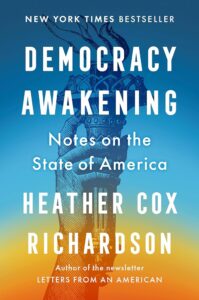 4. Democracy Awakening: Notes on the State of America by Heather Cox Richardson – Heather Cox Richardson is a Professor of History at Boston College who came to prominence a few years ago because of her Facebook and Substack essays entitled “Letters from an American,” where she views the day’s political news through a historic lens. Democracy Awakening takes a similar tack, but also looks forward, considering what the United States will look like if the country chooses a leader in 2024 that has authoritarian (or even, fascist) leanings. I’ve listened to and read a lot of writing that Richardson has done, and it seems to me that her superpower is that she has an academic’s ability to research and understand history, and the ability to convey what she knows so even mere mortals like me can understand and appreciate it. In Democracy Awakening, Richardson examines the state of our nation, including recent events like the 2020 election and the January 6 insurrection, and analyzes them using her knowledge and understanding of history. In particular, Richardson looks at the way a group of wealthy elites has for decades—in some cases dating back to the founding—made war on the idea that “all men are created equal.” This group believes only “true Americans”—once identified as property-owning white men, and more recently defined as primarily wealthy, “right thinking,” white men—should have the right to vote and are ordained to run the country. However, as has happened so many other times in our country’s history, Richardson points out that marginalized groups are rising up, demanding that we renew and expand our commitment to the values espoused in the Declaration of Independence and codified in the Constitution. There’s a lot in this book that is frightening and disturbing, but in the end, Richardson strikes a hopeful tone, believing we are capable of reclaiming the freedom and equality that is our birthright. If you want to understand how we find ourselves at this particular juncture in history, you need to read Democracy Awakening.
4. Democracy Awakening: Notes on the State of America by Heather Cox Richardson – Heather Cox Richardson is a Professor of History at Boston College who came to prominence a few years ago because of her Facebook and Substack essays entitled “Letters from an American,” where she views the day’s political news through a historic lens. Democracy Awakening takes a similar tack, but also looks forward, considering what the United States will look like if the country chooses a leader in 2024 that has authoritarian (or even, fascist) leanings. I’ve listened to and read a lot of writing that Richardson has done, and it seems to me that her superpower is that she has an academic’s ability to research and understand history, and the ability to convey what she knows so even mere mortals like me can understand and appreciate it. In Democracy Awakening, Richardson examines the state of our nation, including recent events like the 2020 election and the January 6 insurrection, and analyzes them using her knowledge and understanding of history. In particular, Richardson looks at the way a group of wealthy elites has for decades—in some cases dating back to the founding—made war on the idea that “all men are created equal.” This group believes only “true Americans”—once identified as property-owning white men, and more recently defined as primarily wealthy, “right thinking,” white men—should have the right to vote and are ordained to run the country. However, as has happened so many other times in our country’s history, Richardson points out that marginalized groups are rising up, demanding that we renew and expand our commitment to the values espoused in the Declaration of Independence and codified in the Constitution. There’s a lot in this book that is frightening and disturbing, but in the end, Richardson strikes a hopeful tone, believing we are capable of reclaiming the freedom and equality that is our birthright. If you want to understand how we find ourselves at this particular juncture in history, you need to read Democracy Awakening.
 3. Oath and Honor: A Memoir and a Warning by Liz Cheney – Liz Cheney has as impeccable conservative political credentials as nearly anyone in politics. She comes from conservative and Republican royalty. Her father served as a Congressman, Chair of the House Republican Conference, Chief of Staff to President Gerald Ford, and Vice-President in George W. Bush’s administration. Liz served in the State Department, was a Congresswoman, and served as the Chair of the House Republican Conference. But after the insurrection at the Capitol on January 6, 2021, Liz Cheney became the most outspoken critic of Donald Trump on the Republican side of the aisle. She has been unflinching in her criticism of Trump and she never wavered, even as other Republicans excused the behavior of the former POTUS. Her outspoken criticism of Trump cost her her position in the House Republican Conference and eventually led to her defeat in the 2022 election for Congress in Wyoming. That hasn’t slowed her down. In Oath and Honor, Cheney offers a detailed account of the events leading up to January 6, the harrowing hours while Congress was under attack by right-wing terrorists, and the evidence collected and presented by the House January 6 Committee, where she served as its vice-chair. Her descriptions are raw and detailed, and Cheney brings the receipts to back up her claims and warnings. Although I knew the details of the January 6 insurrection, listening to Cheney recall the events of that day sent a shiver up my spine. The book is a stark reminder of what can happen when we elect someone not committed to the Constitution and country, and who works for his own benefit, not for the good of the nation.
3. Oath and Honor: A Memoir and a Warning by Liz Cheney – Liz Cheney has as impeccable conservative political credentials as nearly anyone in politics. She comes from conservative and Republican royalty. Her father served as a Congressman, Chair of the House Republican Conference, Chief of Staff to President Gerald Ford, and Vice-President in George W. Bush’s administration. Liz served in the State Department, was a Congresswoman, and served as the Chair of the House Republican Conference. But after the insurrection at the Capitol on January 6, 2021, Liz Cheney became the most outspoken critic of Donald Trump on the Republican side of the aisle. She has been unflinching in her criticism of Trump and she never wavered, even as other Republicans excused the behavior of the former POTUS. Her outspoken criticism of Trump cost her her position in the House Republican Conference and eventually led to her defeat in the 2022 election for Congress in Wyoming. That hasn’t slowed her down. In Oath and Honor, Cheney offers a detailed account of the events leading up to January 6, the harrowing hours while Congress was under attack by right-wing terrorists, and the evidence collected and presented by the House January 6 Committee, where she served as its vice-chair. Her descriptions are raw and detailed, and Cheney brings the receipts to back up her claims and warnings. Although I knew the details of the January 6 insurrection, listening to Cheney recall the events of that day sent a shiver up my spine. The book is a stark reminder of what can happen when we elect someone not committed to the Constitution and country, and who works for his own benefit, not for the good of the nation.
 2. Pappyland: The Story of Family, Fine Bourbon, and the Things That Last by Wright Thompson – Wright Thompson is arguably the best sportswriter in America. His long-form features, which he writes for ESPN the Magazine, are always terrific. I look forward to everything he writes. In Pappyland, Thompson steps out of the sports world (albeit, not too far) to tell the story of the legendary (and often expensive) Pappy Van Winkle Bourbon and the family behind the name. As with much of Thompson’s writing, he injects some of his own story into the tale he is telling. His relationship with his father often plays a role in his stories, as does his young and growing family. Perhaps more than anything, Thompson injects his southern heritage and love for southern food, drink, and tradition into the Pappy story, which is already chock full of southern heritage and tradition. Thompson is not only a superb writer but also a master storyteller (those do not always go hand-in-hand). In Pappyland, he presents his characters in all of their vibrant and bent-halo glory, and tells their story in a intriguing and heartfelt way. I didn’t know anything about the Van Winkle family when I picked up Pappyland. By the time I put it down, I cared about them and wanted to raise a glass with them. That’s the Wright Thompson way.
2. Pappyland: The Story of Family, Fine Bourbon, and the Things That Last by Wright Thompson – Wright Thompson is arguably the best sportswriter in America. His long-form features, which he writes for ESPN the Magazine, are always terrific. I look forward to everything he writes. In Pappyland, Thompson steps out of the sports world (albeit, not too far) to tell the story of the legendary (and often expensive) Pappy Van Winkle Bourbon and the family behind the name. As with much of Thompson’s writing, he injects some of his own story into the tale he is telling. His relationship with his father often plays a role in his stories, as does his young and growing family. Perhaps more than anything, Thompson injects his southern heritage and love for southern food, drink, and tradition into the Pappy story, which is already chock full of southern heritage and tradition. Thompson is not only a superb writer but also a master storyteller (those do not always go hand-in-hand). In Pappyland, he presents his characters in all of their vibrant and bent-halo glory, and tells their story in a intriguing and heartfelt way. I didn’t know anything about the Van Winkle family when I picked up Pappyland. By the time I put it down, I cared about them and wanted to raise a glass with them. That’s the Wright Thompson way.
 1. Liberation Day by George Saunders – George Saunders is the finest living short story writer in America. There’s an argument to be made that he holds that title among both living and dead short story writers. In Liberation Day, Saunders offers more of his trademark wicked humor, excruciating heartbreak, and uber-human (a phrase I just made up) characters. The stories are all terrific, but the one that has stuck with me the longest and most relentlessly is “Love Letter.” I wrote previously about this awesome story. It was originally published in the New Yorker in May 2020 and served as a warning about what life in the United States could become if we didn’t protect our democracy. The story is even more prescient and important now as we get ever closer to the 2024 election. In a nutshell, the love letter in question is written by a grandfather to his grandson, warning him not to get on the wrong side of the new authoritarian government, and trying to explain how the grandfather and his generation could allow our proud and powerful country to fall into the hands of such an unfit, immoral tyrant. As he does with all of his stories, Saunders displays a gentle touch, telling the story in a subtle manner, yet getting his point across with the same ferocity as if he were wielding a sledgehammer. I read a lot of good books in 2023, but Liberation Day was the best of them all.
1. Liberation Day by George Saunders – George Saunders is the finest living short story writer in America. There’s an argument to be made that he holds that title among both living and dead short story writers. In Liberation Day, Saunders offers more of his trademark wicked humor, excruciating heartbreak, and uber-human (a phrase I just made up) characters. The stories are all terrific, but the one that has stuck with me the longest and most relentlessly is “Love Letter.” I wrote previously about this awesome story. It was originally published in the New Yorker in May 2020 and served as a warning about what life in the United States could become if we didn’t protect our democracy. The story is even more prescient and important now as we get ever closer to the 2024 election. In a nutshell, the love letter in question is written by a grandfather to his grandson, warning him not to get on the wrong side of the new authoritarian government, and trying to explain how the grandfather and his generation could allow our proud and powerful country to fall into the hands of such an unfit, immoral tyrant. As he does with all of his stories, Saunders displays a gentle touch, telling the story in a subtle manner, yet getting his point across with the same ferocity as if he were wielding a sledgehammer. I read a lot of good books in 2023, but Liberation Day was the best of them all.

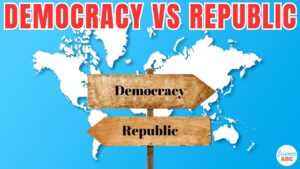 It has become fashionable as of late for Republicans–especially the MAGA variety–to claim that the United States is not a democracy, but is instead a constitutional republic. Sen. Mike Lee (R-UT) made a big splash when he wrote on X (formerly Twitter) that the United States is not a democracy. He followed up that tweet with an op-ed in which he tried to support his point with a lot of words, but was never quite able to make the case.
It has become fashionable as of late for Republicans–especially the MAGA variety–to claim that the United States is not a democracy, but is instead a constitutional republic. Sen. Mike Lee (R-UT) made a big splash when he wrote on X (formerly Twitter) that the United States is not a democracy. He followed up that tweet with an op-ed in which he tried to support his point with a lot of words, but was never quite able to make the case.
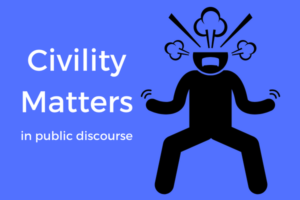 I’ve been writing more about political issues recently. Part of the reason for this is that my interest in politics has piqued in the past few years. Also, it is my belief that the upcoming election in November may be the most important in our history. In fact, I am convinced that our democracy is on the line. And once we lose our democracy, there is no legal way to get it back.
I’ve been writing more about political issues recently. Part of the reason for this is that my interest in politics has piqued in the past few years. Also, it is my belief that the upcoming election in November may be the most important in our history. In fact, I am convinced that our democracy is on the line. And once we lose our democracy, there is no legal way to get it back.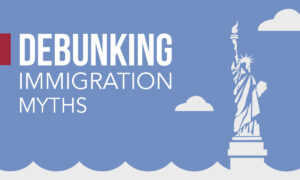 Earlier this week, I shared some
Earlier this week, I shared some  My grandfather was just 16 years old when he came to the United States in 1904. He left his home in Romania, boarded a ship in Hungary, and sailed to New York, disembarking on Ellis Island. He didn’t have any money, didn’t speak English, didn’t have a job, and didn’t have family waiting for him in America. After spending a short time in New York, he left for Dearborn, Michigan, and eventually settled in Aurora, Illinois.
My grandfather was just 16 years old when he came to the United States in 1904. He left his home in Romania, boarded a ship in Hungary, and sailed to New York, disembarking on Ellis Island. He didn’t have any money, didn’t speak English, didn’t have a job, and didn’t have family waiting for him in America. After spending a short time in New York, he left for Dearborn, Michigan, and eventually settled in Aurora, Illinois. If you watched the Super Bowl last Sunday, you probably saw the commercial for He Gets Us, a Christian group that is doing PR work for Jesus. If you didn’t see the commercial during the Super Bowl, take a look:
If you watched the Super Bowl last Sunday, you probably saw the commercial for He Gets Us, a Christian group that is doing PR work for Jesus. If you didn’t see the commercial during the Super Bowl, take a look: I am a long-time user of
I am a long-time user of 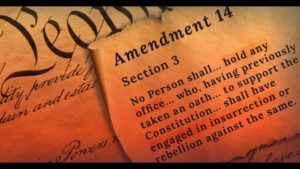 The U.S. Supreme Court (SCOTUS) will hear the case of Trump v Anderson today. The case was appealed from the Colorado Supreme Court which found that Donald Trump had participated in an insurrection on January 6, 2021, and that under the language of section 3 of the 14th Amendment to the Constitution, was disqualified from serving as president in the future. As a result of that decision, the Colorado Supreme Court said that Trump was excluded from being on the state’s presidential ballot.
The U.S. Supreme Court (SCOTUS) will hear the case of Trump v Anderson today. The case was appealed from the Colorado Supreme Court which found that Donald Trump had participated in an insurrection on January 6, 2021, and that under the language of section 3 of the 14th Amendment to the Constitution, was disqualified from serving as president in the future. As a result of that decision, the Colorado Supreme Court said that Trump was excluded from being on the state’s presidential ballot. Abraham Lincoln knew Donald Trump. Although he may not have known Trump by name. he most certainly knew the man.
Abraham Lincoln knew Donald Trump. Although he may not have known Trump by name. he most certainly knew the man. Back in 2020, I stopped writing fiction. At the time, I was working on two different novels. One was tentatively titled Second Chances, and the other, Leaving Home. I had recently ended a relationship, and I needed to take a break. I wasn’t in the right head space to concentrate on the two novels.
Back in 2020, I stopped writing fiction. At the time, I was working on two different novels. One was tentatively titled Second Chances, and the other, Leaving Home. I had recently ended a relationship, and I needed to take a break. I wasn’t in the right head space to concentrate on the two novels. There is a Chinese curse that says, “May you live in interesting times.” To be certain, we live in extraordinarily interesting times. And the times we live in affect our lives in various ways, including impacting my reading habits.
There is a Chinese curse that says, “May you live in interesting times.” To be certain, we live in extraordinarily interesting times. And the times we live in affect our lives in various ways, including impacting my reading habits.
 examine the current Court and explore how it came to be so far-right and reactionary. Both books do an excellent job of dissecting the Court; not only how it came to be so ideologically lopsided, but what the results have meant for the country. I understand that most people do not find entertainment in reading about the Supreme Court, but if you do, I recommend both Nine Black Robes and The Supermajority.
examine the current Court and explore how it came to be so far-right and reactionary. Both books do an excellent job of dissecting the Court; not only how it came to be so ideologically lopsided, but what the results have meant for the country. I understand that most people do not find entertainment in reading about the Supreme Court, but if you do, I recommend both Nine Black Robes and The Supermajority. 9.
9.  8.
8.  7.
7.  6.
6.  amendments to the Constitution so profoundly changed our country. In fact, I would argue, we are still discovering just how profound those changes were. The story we tell ourselves as Americans—that our core values as a nation were stated in the Declaration of Independence, fought for in the Revolutionary War, and made law in the Constitution—not only no longer serve us, but the story isn’t even true. The values we hold dear—particularly personal liberty and equality before the law—were not part of our Founding Fathers’ vision. Instead, those values were stated in Lincoln’s Gettysburg Address, fought for in the Civil War, and made law through the Reconstruction Amendments. Roosevelt (the great-grandson of Theodore Roosevelt) and Foner both mine this idea in different ways and from slightly different perspectives. The one criticism I have of both books (Honestly, who am I to criticize) is that the books, which are written by academics for a lay audience, fall somewhere in between academic and popular nonfiction. They’re not quite dense and detailed enough to be considered academic tomes, yet they aren’t entertaining enough for the average layman. After all, they are telling an exciting story that most of us are at least a little familiar with. Both books would have benefited from more storytelling and less step-by-step progression. But to be clear, I still enjoyed reading both books and would highly recommend them both to anyone that wants to better understand the history of our country and our constitution.
amendments to the Constitution so profoundly changed our country. In fact, I would argue, we are still discovering just how profound those changes were. The story we tell ourselves as Americans—that our core values as a nation were stated in the Declaration of Independence, fought for in the Revolutionary War, and made law in the Constitution—not only no longer serve us, but the story isn’t even true. The values we hold dear—particularly personal liberty and equality before the law—were not part of our Founding Fathers’ vision. Instead, those values were stated in Lincoln’s Gettysburg Address, fought for in the Civil War, and made law through the Reconstruction Amendments. Roosevelt (the great-grandson of Theodore Roosevelt) and Foner both mine this idea in different ways and from slightly different perspectives. The one criticism I have of both books (Honestly, who am I to criticize) is that the books, which are written by academics for a lay audience, fall somewhere in between academic and popular nonfiction. They’re not quite dense and detailed enough to be considered academic tomes, yet they aren’t entertaining enough for the average layman. After all, they are telling an exciting story that most of us are at least a little familiar with. Both books would have benefited from more storytelling and less step-by-step progression. But to be clear, I still enjoyed reading both books and would highly recommend them both to anyone that wants to better understand the history of our country and our constitution. 5.
5.  4.
4.  3.
3.  2.
2.  1.
1.